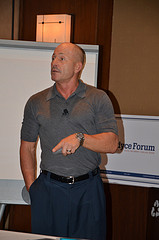What are you doing to develop your business?
If there was a theme to this morning’s Fordyce Forum presentations that might have been it. The final sessions of this last day of the best attended Forum since the start of the recession in 2008 all focused on practical advice for thriving as an owner or solo, rounding out the “hundreds of tips” that conference chair Barbara Bruno promised during her Thursday welcome.
Among those tips were these:
- Track your placements. It’s wise business, and smart networking;
- Do what the Big Billers do and plan tomorrow before leaving the office today;
- Say thank you to clients, and candidates;
- Stand out from the crowd;
- Have a playbook of standards, so your team knows what’s expected.
In the recruiter workshop track, Joel Slenning told a full house “How to Elevate Your Desk Production to Extreme Heights. Next door, Rob Mosley and Karen Schmidt offered insights from Next Level Exchange on “What Great Managers Do.”
Not surprisingly, what both audiences heard was the need to set goals, plan, and hold yourself – or your team – accountable. “The first thing,” Mosley told his audience of mostly owners, “is to put together a playbook.” By that he meant a set of standards by which recruiters can be measured.
It’s not a job an owner or manager should do alone. “Don’t mandate,” cautioned Schmidt. “Delegate. Have the team develop the standards… They will come along for the ride.”

In their rapid-fire, tips-packed presentation, Schmidt and Mosley talked about using the standards to measure recruiter performance and compare it against their individual plans and other recruiters. In a packed distributed to everyone in the workshop was a form they use to gauge weekly production. Besides using the “Progress, Analysis, and Review” to track performance, it’s also used to predict monthly closes and revenue.
However, warned Mosley, the weekly review is “a tool. Not a weapon.” Coaching and training are its goals.
Getting things underway earlier, 2012 Fordyce Forum chair Barbara Bruno offered the early risers dozens of ideas during her nine lesson keynote address. Part how-to, part motivational, she provided a blueprint of sorts to “Take Your Business Through the Roof.”
Successful people, she said outlining lesson one, “do what other people don’t.” Bruno suggested that every recruiter and every owner make a list of all the workday things they do; number them; then delegate the bottom 10 to others, even if that means hiring an assistant for a few hours a week.
“You’ve got habits. Some things we do because we always have. Until you break those habits nothing’s going to happen,” she said.
Lesson two – You have to stand out, said the PowerPoint slide. What can you say that no one else can? – prompted a number of suggestions from the audience. One recruiter sends Thanksgiving cards to clients, getting ahead of the holiday card clutter. Another started a LinkedIn group that now has 70,000+ members. Others track placements, maintaining at least a casual contact with them.
That prompted one owner to ask why? “Once I place somebody, they’re gone,” he said.
He got a quick answer from his colleagues: Today’s placements become tomorrow’s candidates – or even tomorrow’s clients. And they can be counted on for future referrals.
“That’s a change,” said the guy who asked the question, “that’s going to occur Monday.”
One of the biggest “ah ha’s” followed an engineering recruiter who recounted the time he withdrew a sendout that was loved by the hiring manager. “Something wasn’t right,” the recruiter told the audience. “I pulled him.” His surprised client thanked him and said it was the first time a recruiter had warned them off a candidate.
Her other lessons?
- Prepare for the unexpected
- Don’t fear failure. Conduct a weekly review of what you did right and wrong. Then fix the latter, but don’t be overly concerned about something not going right.
- Determine friend or foe. Walk away from the negative. Represent the client. Talk to them to learn their pain points and needs before the marketing presentation.
- Timing is everything. There are no coincidences.
- Play every day like a winner. Big billers know what they are going to do every day.
- Attract new business. You do it based on reputation and performance. Give yourself a report card. Survey your clients. Ask them what they think.
- Realize: If you think you can, or you think you can’t, you are 100% correct. Believe in yourself.
